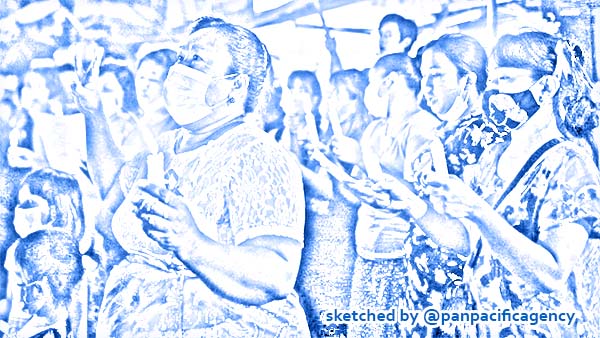Myanmar protesters block arrests

Hundreds of people have rallied in Myanmar's main city, Yangon, to protest against this week's military coup. Photo: Reuters. Sketched by the Pan Pacific Agency.
YANGON, Feb 13, 2021, SCMP. Opposition to Myanmar’s new military regime intensified on Saturday as spontaneous neighbourhood watch groups mobilised to thwart arrests of anti-coup activists and the United Nations demanded the release of ousted leader Aung San Suu Kyi, South China Morning Post reported.
The UN’s top human rights body on Friday passed a consensus resolution urging military leaders in Myanmar to immediately release civilian government leaders, while watering down an initial draft text amid pressure led by China and Russia.
After the updated resolution passed with no opposition, Chinese Ambassador Chen Xu thanked the sponsors for “adopting our recommendations” but said China still was distancing itself from the measure.
UN spokesman Stephane Dujarric called the resolution’s adoption “a very important step” that shows “the international community will speak strongly … in calling for a reversal of the events we’ve seen in Myanmar, and for the full respect of the democratic will of the people of Myanmar as well as full respect of their human rights”.
The decision also calls on military leaders to grant free speech and political rights, and to lift internet curbs immediately.
Myanmar’s Geneva envoy, Myint Thu, called the resolution “unacceptable”. He added: “We need understanding and cooperation in time of transition in the country.”
China, the Philippines, Russia, Venezuela and Bolivia distanced themselves from the resolution.
GROWING PROTESTS
The February 1 army takeover that brought a decade-old democracy to an end has unleashed a storm of anger and defiance, with huge daily protests bringing urban centres around Myanmar to a standstill.
Since taking Suu Kyi and her top allies into custody, troops have stepped up arrests of civil servants, doctors and others joining strikes demanding the generals relinquish power.
Crowds defied overnight curfews to mass on the streets as night fell, hours after finishing a seventh straight day of rallies, following rumours that police were preparing to launch a fresh wave of arrests.
One group swarmed a hospital in the city of Pathein on rumours that a popular local doctor would be taken, chanting a Buddhist prayer urging protection from harm.
“If I have problems, I will ask for your help,” doctor Than Min Htut told the group who had come to aid him, flashing the three-finger salute that has come to symbolise resistance to the coup.
Than Min Htut confirmed on Saturday he was still free and would continue to participate in a civil disobedience campaign opposing military rule.
People in Yangon skirted a junta ban on Facebook to organise neighbourhood watch groups that warned of rumoured arrests.
They signalled calls to gather outside buildings by banging pots and pans – a nightly phenomenon in the days after the coup that is traditionally associated with driving out evil.
“We didn’t know who will be taken, but when we heard the sound, we went out to join our neighbours,” said Tin Zar, a storekeeper in Yangon’s north. “Even if they shoot, we are not afraid.”
Airline staff, health workers, engineers and school teachers were among groups that joined the protest marches on Saturday and which have rallied to a civil disobedience campaign that has shut down a swath of government business.
“We are preschool teachers, Every child our future, We don’t want dictatorship,” said one banner.
A group of protesters gathered outside the Singapore embassy in Yangon to urge banks to stop dealing with military-linked banks.
Saturday’s protests coincided with the birthday of General Aung San, the country’s independence leader and father of Suu Kyi. His name and image appeared on signs carried by some demonstrators.
More than 320 people have been arrested since last week’s coup, according to the Assistance Association for Political Prisoners (AAPP) monitoring group.
At least two people in Naypyidaw were shot by police and critically injured, including one 20-year-old woman who remains in intensive care and has since become a symbol of opposition to the junta.
There have been many reports over the past three nights of raids during a curfew in which security personnel have tried to seize people from their homes.
In several cases, neighbours and others people have rushed to the scene in such numbers that security forces have abandoned their attempts to haul in their targets. Videos of such raids have been widely posted on social media.
Officers cleared a sit-in protest by university students in the port city of Mawlamyine on Friday with rubber bullets, injuring several demonstrators.
Nine others taken into custody were later freed after a crowd mobbed a police station and demanded their release.
Authorities claimed protesters had thrown stones at officers who had tried to disperse the crowd, according to a Saturday report in the state-run newspaper Global New Light of Myanmar.
It also reported counter-protests by military supporters in various parts of the country, citing crowd estimates a small fraction of the anti-coup rallies seen this week.
Army chief Min Aung Hlaing has warned striking civil servants to return to work and the new regime has set up a hotline to report government employees joining demonstrations.
So far, the generals remain undeterred by the widespread condemnation on the streets – and overseas.
They justified seizing power with claims of widespread voter fraud in November’s election, which Suu Kyi’s National League for Democracy won in a landslide.
Washington this week imposed targeted sanctions against top military brass.
But traditional allies of the country’s armed forces, including Russia and China, have slammed the international outcry against the coup as interference in Myanmar’s “internal affairs”.
Suu Kyi has not been seen since her detention nearly two weeks ago.
Additional reporting by AP, DPA, Reuters